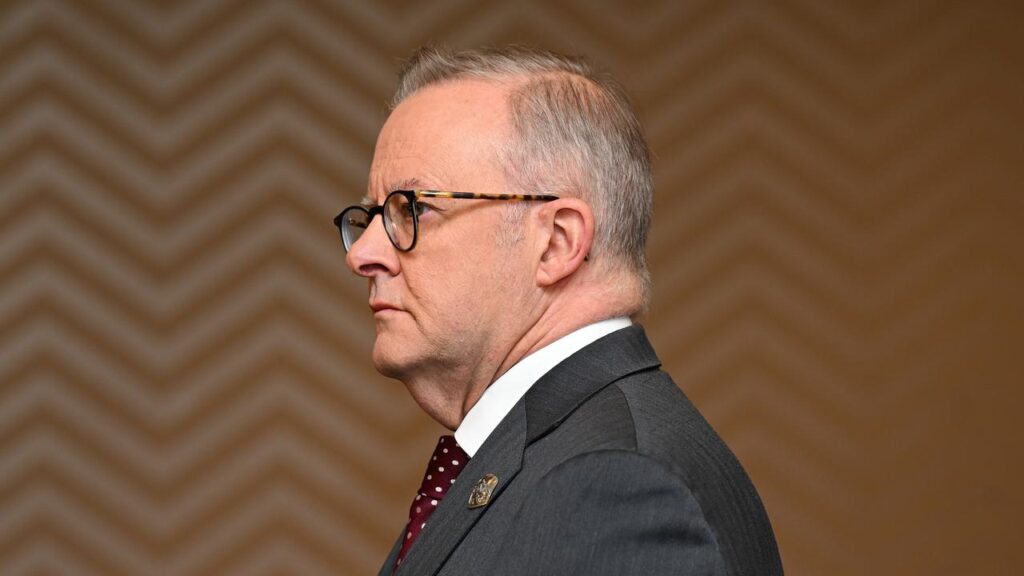Middle East conflict ends plan for PM’s key Trump talk
Kat Wong |

The prime minister’s much-anticipated meeting with Donald Trump has been cancelled.
Anthony Albanese was scheduled to hold his first face-to-face talks with the US president on the sidelines of the G7 summit in Canada on Tuesday local time.
But 24 hours before their discussion, the US president’s press secretary revealed Mr Trump would leave early due to the growing conflict between Israel and Iran.

The two are not expected to meet before Mr Trump flies out.
“Given what is occurring in the Middle East, this is understandable,” a spokesperson from the prime minister said.
Mr Trump’s press secretary Karoline Leavitt said much was accomplished during the president’s time at the summit.
“The president had a great day at the G7 … but because of what’s going on in the Middle East, President Trump will be leaving tonight after dinner with Heads of State,” she posted on X.
Mr Trump was also scheduled to meet with other leaders like Ukrainian President Volodymyr Zelenskiy, Indian Prime Minister Narenda Modi and Mexican President Claudia Scheinbaum on the last day of the summit.
The news broke just minutes after Mr Albanese held his last press conference of the day.
The prime minister told reporters he prepared for the meeting through a variety of means, including contacting those close to the US president, like Australian golfer Greg Norman.
“I’ve engaged as much as possible because I think that I have a great responsibility to take that responsibility seriously,” he said.
Mr Albanese was expected to advocate for Australia’s nuclear submarine deal with the US and UK, which the Pentagon is reviewing, and to try to negotiate an exemption from Mr Trump’s controversial tariffs.
But he is now unlikely to see the president before the departure, as the prime minister is set to attend a dinner for nations invited to the summit that are not part of the G7.

For days, many had speculated that the escalation between Israel and Iran would overshadow the meeting of international leaders.
About an hour before it was revealed Mr Trump would leave, the US president urged everyone to immediately evacuate the Iranian capital Tehran in a post on Truth Social.
The prime minister also expressed his concerns.
“We are deeply concerned and urge all parties to prioritise dialogue and diplomacy,” Mr Albanese said.
The prime minister previously held his first bilateral meeting with his Canadian counterpart Mark Carney and also had discussions on regional security with the newly elected South Korean President Lee Jae-myung.

Mr Albanese is also due to participate in a string of diplomatic talks on Tuesday with UK Prime Minister Keir Starmer, French President Emmanuel Macron, Japanese Prime Minister Shigeru Ishiba and German Chancellor Friedrich Merz.
Despite the US launching a review to explore whether the AUKUS deal aligns with Mr Trump’s “America first” agenda, there is hope the president might have formed a positive view of the nuclear submarine deal without Australia’s help.
After a bilateral meeting on Monday, the president and the UK prime minister backed AUKUS, with Mr Starmer adding it was “a really important deal to both of us”.
But the tariff issue remains.
Australian aluminium and steel products face 50 per cent tariffs when shipped to the US, while other exports have been hit with a baseline 10 per cent levy.
The prime minister was already tempering expectations before Mr Trump’s departure announcement.
“I don’t think it would be reasonable to expect that you would have a complete change and a complete resolution of the issues,” Mr Albanese said.
During his first phone conversation with the president, Mr Trump said he would give great consideration to Australia and the prime minister said he expected that reflection to continue.
“We believe very firmly that it is in the United States’ interest, as well as in Australia’s interest, for these tariffs to not be in place,” Mr Albanese said.
AAP